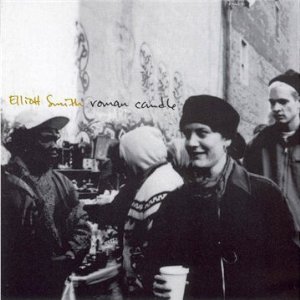No one except his most abstruse fans surely believes that Roman Candle is Elliott Smith’s best album; it is a collection of sketchy, almost half-written songs from an undeniably extraordinary artist yet to find his voice. The fact that this remastered version, put together by archivist, family friend and guardian of Smith’s back catalogue Larry Crane, is out at all is testament to the fact that it is a problematic (but deeply charismatic) record, more open to revisionism than the slew of impeccable Elliott Smith albums that kept coming up until his self-inflicted death in 2004.
Released in the US in 1994, his debut is a curious stumble into solo work, a selection of angry, often beautiful songs sent to Cavity Search Records as demos at the urging of his then girlfriend (at all the momentous points in Smith’s life, the ambiguous figure of an influential girlfriend seems to lurk in the background). When Roman Candle came out, a 24-year-old Smith was still in his college band Heatmiser, a loud, unsubtle ensemble that the years have not been kind to, despite a modicum of success in the early 90s.
From the first rather manic acoustic strums of the opening title track, it is clear that Roman Candle lacks the immediate impact provided by future Elliott Smith album openers, suggesting that his unique ability to frame LPs and structure them to such utter perfection had not yet matured. Compare the rather one-dimensional first track here with the layers and intrigue of the likes of ‘Son Of Sam’ or ‘Sweet Adeline’. ‘Roman Candle’ feels like you have walked in on the middle of something… which granted, is not without a certain appeal.
‘Condor Avenue’ is, however, a triumph, and an early example of his classic move from an inauspicious, even mediocre verse melody to a movingly expressive outpouring in the chorus. His voice receives a sudden burst of animation, and thus a key Elliott Smith trick is born. The other example of excellence on Roman Candle is ‘Last Call’, which aside from its attractive chord changes and a sublime electric guitar part, showcases his skill for setting contempt and repulsion to music like no other, most memorably done on ‘Christian Brothers’ from his next, self-titled, album. On ‘Last Call’ Smith practically spits bile as he repeats the line ”sick of you”. These songs were not originally meant to be heard by a public, implying that they acted as a sort of personal catharsis for their maker, a modus operandi he didn’t exactly let up in subsequent years.
As for the rest, No Names #1, #2, #3, and #4 drift by in a haze of imaginative guitar and earnest lyrics without stopping the listener in their tracks, while closing instrumental ‘Kiwi Maddog 20/20’ is pretty enough.
But frankly, we knew all this already. Crane’s remaster was instigated, in his words, because “the guitar ‘squeaks’ were jarring and very loud, and that many of the hard consonants and ‘S’ sounds were jarring and scratchy sounding.” Yet all those improvements are barely noticeable. Not because Crane did a bad job, but because the scratches and blemishes are immaterial to what these songs convey (they are also not the reason for any potential ‘rough charm’). The fact is that to the casual ear there is very little that is different sonically, and in the absence of any alternative takes or unreleased tracks as bonus material, the enterprise is merely one of getting Smith’s most overlooked album its time in the limelight through reappraisal. And whether the ‘S’ sounds are sharp or not, Roman Candle deserves that.


